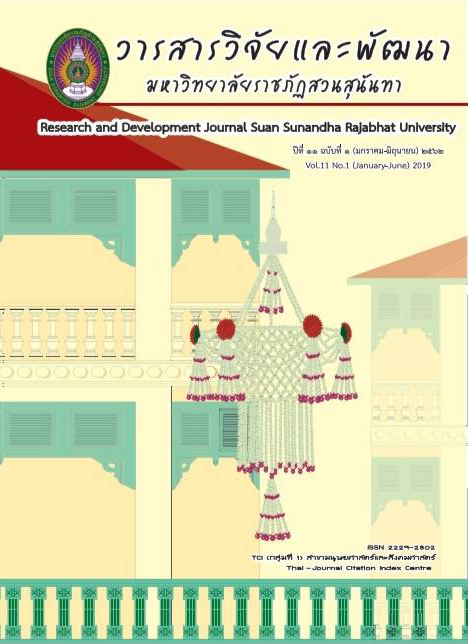Preferred Future of Filipino School Leadership
DOI:
https://doi.org/10.53848/irdssru.v11i1.145239คำสำคัญ:
school leadership, leadership traits, Filipino leadershipบทคัดย่อ
This research is based on the respondents’ perceptions on the preferred future of Filipino School Leadership. Utilizing OECD’s Improving School Leadership Module, graduate students of a teacher education institution in Manila were surveyed on their ideas on the characteristics of school leadership as they would like it to be. This study rests on the main problem: “What is the preferred future of Filipino school leadership?” Three policy levels (Re-defining School Leadership Responsibilities, Developing Skills for Effective Leadership, and Making School Leadership an Attractive Profession) from the module were used in this study which hare assumed to have a link on student achievement. Identifying a brand new kind of school leadership contributes to sustainability and development efforts along with the following epitomic image of a Filipino school leader: mentor of mentors, decision-maker and strategist, innovative empiricist, stand-alone leader but open-minded learner, team recruiter, leader and learner, and made, not born.
เอกสารอ้างอิง
Australian Institute for Teaching and School Leadership. (2015). Preparing future leaders --- effective preparation for aspiring school principals.
Bantwini, B. and Letseka, M. (2016). South African teachers caught between nation building and global demands: Is there a way out/Forward? Educational Studies. 52 (4); 329 – 345.
Bennett, D. (2000). The school of the future:
Key issues for school leaders. Nottingham, UK: National College of School Leaders.
Bush, T. (2017). Preparing for school principals: Rationale and practice. Journal of the British Educational Leadership, Management and Administration Society 44 (4).
Coates, M. (2010). Future tense. In: Coates, M. (ed.) Future Schools in Shaping a New Educational Landscape: Exploring Possibilities for Education in the 21st Century: London: Continuum International Publishing.
Costellow, T. (2011). The Preferred Principal: Leadership Traits, Behaviors, and Gender Characteristics School Teachers Desire in A Building Leader. Western Kentucky University.
DuFour, R. and Mattos, M (2013). How do principals really improve schools? Educational Leadership: The Principalship. 70:7; 34 – 40.
Elahe, N. (2016). Mentoring beyond borders: Preparing educators and learners for the ASEAN classroom. Baguio Midland Courier, Retrieved from https://www.baguiomidlandcourier.com.ph/anniv17_ article.asp?mode=anniv_
2017/supplements/nixon.txt, May 25, 2017.
Hauserman, C., Ivankova, N. & Stick, L. (2007). Teacher Perceptions of Principals’ Leadership Qualities: A Mixed Methods Study. American Educational Research Association.
Horng, E., Kalogrides D., & Loeb S. (2009). Principal Differences and the Uneven Distribution of Principals Across Schools. School Leadership Research Report No. 09-2. Institute for Research on Education Policy & Practice. Stanford University.
Johannsen, M. (2014). Types of Leadership Styles: an essential guide. Legacee.com
Leesamphandh, K. (2016). Do educational leaders need authentic leadership? An emerging trend for ASEAN integration and world-class standard project. Proceedings of the IRES 24th International Conference, Singapore, 2nd January 2016. 40 – 44.
Leithwood, K. (2010). Characteristics of school districts that are exceptionally effective in closing the achievement gap. Leadership and Policies in Schools. 9 (3); 245- 291.
Msila, V. (2017). The struggle to improve schools: Voices of South African teacher mentors. Journal of the British Educational Leadership, Management and Administration Society 44 (6). 936 – 950.
Ng, S. and Szetso, S. (2017). Preparing school leaders: The professional development needs of newly appointed principals. Journal of the British Educational Leadership, Management and Administration Society 44 (4). 540 – 557.
Oracion, C. (2013). Teacher Leadership in Public Schools in the Philippines. Institute of Education. University of London.
Organization for Economic Co-operation and Development. (2009). Improving School Leadership: The Toolkit. www.oecd.org/publishing/corrigenda
ดาวน์โหลด
เผยแพร่แล้ว
รูปแบบการอ้างอิง
ฉบับ
ประเภทบทความ
สัญญาอนุญาต
บทความที่ได้รับการตีพิมพ์เป็นลิขสิทธิ์ของ สถาบันวิจัยและพัฒนา มหาวิทยาลัยราชภัฎสวนสุนันทา
ข้อความที่ปรากฏในบทความแต่ละเรื่องในวารสารวิชาการเล่มนี้เป็นความคิดเห็นส่วนตัวของผู้เขียนแต่ละท่านไม่เกี่ยวข้องกับมหาวิทยาลัยราชภัฎสวนสุนันทา และคณาจารย์ท่านอื่นๆในมหาวิทยาลัยฯ แต่อย่างใด ความรับผิดชอบองค์ประกอบทั้งหมดของบทความแต่ละเรื่องเป็นของผู้เขียนแต่ละท่าน หากมีความผิดพลาดใดๆ ผู้เขียนแต่ละท่านจะรับผิดชอบบทความของตนเองแต่ผู้เดียว





